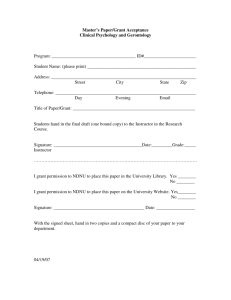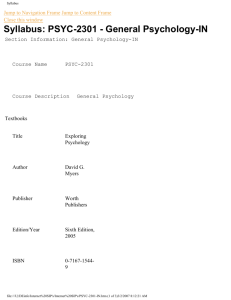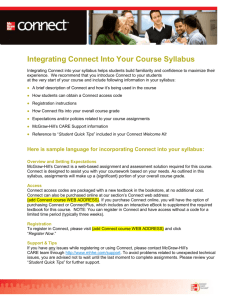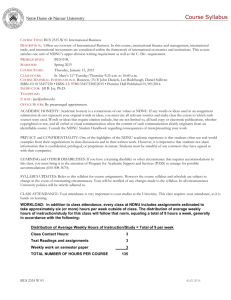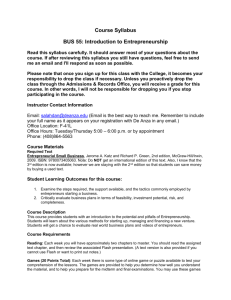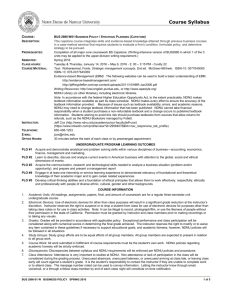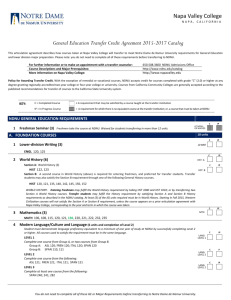BUS 2335-08 International Business GOHAR
advertisement
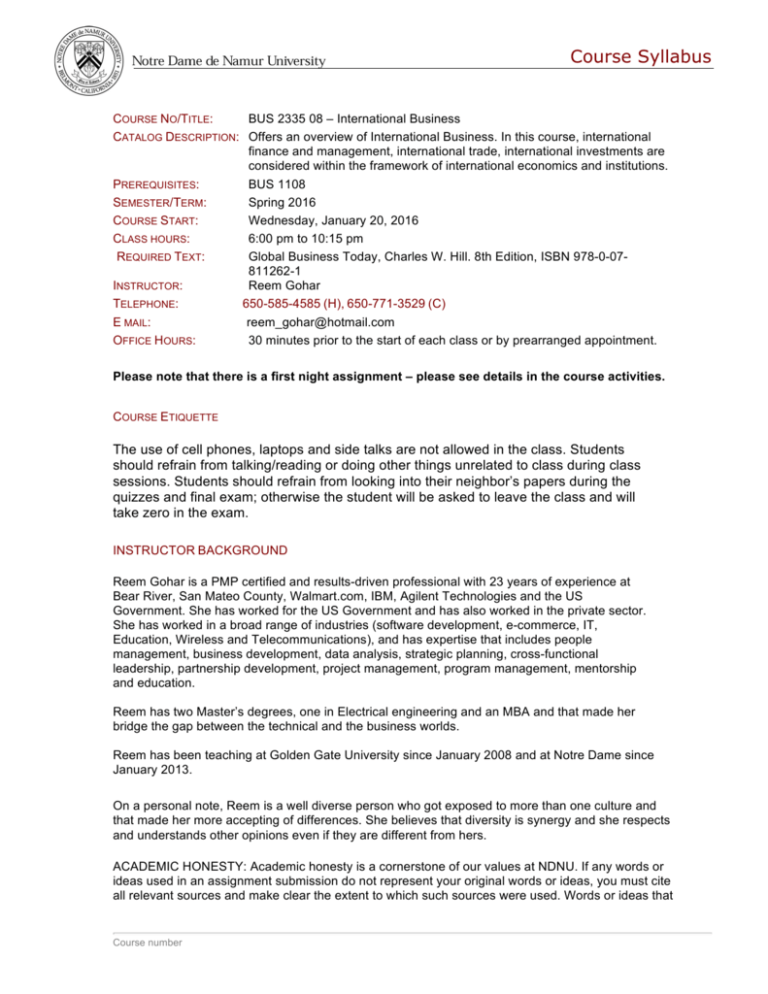
Course Syllabus COURSE NO/TITLE: BUS 2335 08 – International Business CATALOG DESCRIPTION: Offers an overview of International Business. In this course, international finance and management, international trade, international investments are considered within the framework of international economics and institutions. PREREQUISITES: BUS 1108 SEMESTER/TERM: Spring 2016 COURSE START: Wednesday, January 20, 2016 CLASS HOURS: 6:00 pm to 10:15 pm REQUIRED TEXT: Global Business Today, Charles W. Hill. 8th Edition, ISBN 978-0-07811262-1 INSTRUCTOR: Reem Gohar TELEPHONE: 650-585-4585 (H), 650-771-3529 (C) E MAIL: reem_gohar@hotmail.com OFFICE HOURS: 30 minutes prior to the start of each class or by prearranged appointment. Please note that there is a first night assignment – please see details in the course activities. COURSE ETIQUETTE The use of cell phones, laptops and side talks are not allowed in the class. Students should refrain from talking/reading or doing other things unrelated to class during class sessions. Students should refrain from looking into their neighbor’s papers during the quizzes and final exam; otherwise the student will be asked to leave the class and will take zero in the exam. INSTRUCTOR BACKGROUND Reem Gohar is a PMP certified and results-driven professional with 23 years of experience at Bear River, San Mateo County, Walmart.com, IBM, Agilent Technologies and the US Government. She has worked for the US Government and has also worked in the private sector. She has worked in a broad range of industries (software development, e-commerce, IT, Education, Wireless and Telecommunications), and has expertise that includes people management, business development, data analysis, strategic planning, cross-functional leadership, partnership development, project management, program management, mentorship and education. Reem has two Master’s degrees, one in Electrical engineering and an MBA and that made her bridge the gap between the technical and the business worlds. Reem has been teaching at Golden Gate University since January 2008 and at Notre Dame since January 2013. On a personal note, Reem is a well diverse person who got exposed to more than one culture and that made her more accepting of differences. She believes that diversity is synergy and she respects and understands other opinions even if they are different from hers. ACADEMIC HONESTY: Academic honesty is a cornerstone of our values at NDNU. If any words or ideas used in an assignment submission do not represent your original words or ideas, you must cite all relevant sources and make clear the extent to which such sources were used. Words or ideas that Course number Course Syllabus require citation include, but are not limited to, all hard copy or electronic publications, whether copyrighted or not, and all verbal or visual communication when the content of such communication clearly originates from an identifiable source. Consult the NDNU Student Handbook regarding consequences of misrepresenting your work. PRIVACY and CONFIDENTIALITY: One of the highlights of the NDNU academic experience is that students often use real-world examples from their organizations in class discussions and in their written work. However, it is imperative that students not share information that is confidential, privileged, or proprietary in nature. Students must be mindful of any contracts they have agreed to with their companies. LEARNING and OTHER DISABILITIES If you have a learning disability or other circumstance that requires accommodations in this class, you must bring it to the attention of Program for Academic Support and Services (PASS) to arrange for possible accommodations (650-5083670). SYLLABUS UPDATES: Refer to this syllabus for course assignments. However the course syllabus and schedule are subject to change in the event of extenuating circumstances. Your will be notified of any changes made to the syllabus. In all circumstances University policies will be strictly adhered to. CLASS ATTENDANCE: Intensive classes require a stringent absence policy since even once absence may significantly affect achievement of course learning objectives. With only 28 class contact hours as opposed to the traditional 45 contact hours, all class time is critical. A student who misses more than one class period or the equivalent (four accumulated hours) must withdraw from the class and will be assigned a failing grade for the course unless officially dropping the class. It is the student’s responsibility to initiate the drop or withdrawal. There are no exceptions. WORKLOAD: In addition to class attendance, every Intensive class at NDNU includes assignments estimated to take approximately three (or more) hours per week per unit outside of class (14 hours). The distribution of average weekly hours of instruction/study for this class will follow that norm, equaling a total of 18 hours a week, generally in accordance with the following: Distribution of Average Weekly Hours of Instruction/Study = Total of 18 per week Class Contact Hours: 4 Text Readings and Note Taking 8 Research and Writing Assignments 6 TOTAL NUMBER OF HOURS PER COURSE 126 WRITTEN ASSIGNMENTS: Please note that all written assignments with poor grammar will be downgraded. Also, the School of Business and Management requires the use of the American Psychology Association (APA) publication guidelines as a standard for all papers. If you need help with your writing or need more information about writing in the APA format, please make an appointment at the NDNU Writing Center. You can also visit the APA Style webpage at www.apastyle.org/previoustips.html. LATE HOMEWORK: Assignments are to be completed and submitted at the start of each class meeting. Assignments not turned in on time are considered late. Late assignments will be accepted only for one week after the due date; after which time the assignment will not be accepted. Only up to Course number Course Syllabus two assignments may be turned in late during the duration of the class. Late assignments scores will incur a reduction of 20% of point value. PARTICIPATION: Both lecture and classroom activities (both in-class and online) are organized to maximize student involvement in the learning process. You will be evaluated on your comprehension of the material as well as your ability to discuss the relevancy (i.e., research pros and cons) of what was noteworthy in context of this class. ARTICLE PRESENTATIONS: Each Student will present one recent article on any topic discussed in class. Presentations should be 15 minutes only. QUIZZES: There will be unannounced quizzes on any of the chapters covered that day. Those quizzes will be scatted over the Semester EXTRA CREDIT: There is no extra credit for this course. COURSE MATERIAL - Published Textbook Information In accordance with the federal Higher Education Opportunity Act, to the extent practicable, NDNU makes textbook information available as part its class schedule. NDNU makes every effort to ensure the accuracy of the textbook information provided. Due to issues such as textbook availability, errors, and academic reasons, NDNU may need to change textbook information that has been published. NDNU cannot take financial responsibility when a student purchases a non-refundable textbook and a change occurs to published textbook information. Student wishing to avoid this risk should purchase textbooks from sources that allow returns for refunds, such as the NDNU Bookstore. PROGRAM LEARNING OBJECTIVES (PLO): Students will: 1. acquire and demonstrate analytical and problem solving skills within various disciplines of business—accounting, economics, finance, management and marketing; 2. learn to describe, discuss and analyze current events in American business with attention to the global, social and ethical dimensions of events; 3. acquire the communication, research and technological skills needed to analyze a business situation, and prepare and present a management report; 4. develop critical thinking abilities and a foundation of ethical principles that allows them to work effectively, respectfully, ethically and professionally with people of diverse ethnic, cultural, gender and other backgrounds. COURSE LEARNING OBJECTIVES: To introduce the concepts of international business and discuss the challenges and dilemmas facing companies in today’s increasingly competitive global environment. Once understanding the issues of business management applicable to multinational corporations (MNCs), the class will focus on business opportunities in India, China, the European Union (EU), Japan, Russia, as well as free trade groups including the North American Free Trade Agreement (NAFTA), and the Association of South East Asian Nations (ASEAN). The class will engage in ongoing discussions and the repercussions of recent events on international business. The goal of this course is to help students think globally and improve their real world decision-making capabilities. ASSIGNMENTS VALUE & KEY DATES: Course number Course Syllabus Assignments Pt Value Participation and cases analysis 15 Written Assignments 15 Article Presentation 10 Quizzes 5 Mid Term Exam 30 Final Exam 25 POINT TOTALS 100 GRADE/POINT CONVERSION: A+ 100-97 A 96-94 A- 93-90 B+ 89-87 B 86-84 B- 83-80 C+ 79-77 C 76-74 C- 73-70 D+ 69-67 D 66-64 D- 63-60 F 59 or < COURSE ACTIVITIES: Wk 2014 1 1/20 Topics Globalization Assigned Readings • Chapters 1 & 2 1. WRITE OUT The Globalization of Legal Outsourcing case p. 35 (summarize the case using your own words then answer the questions after the case) due in class on 1/13/16 Please hand in a hard copy of the assignment. Please type the assignment and do not submit as hand written. • Chapter 3, 4 & 5 1. WRITE OUT Japan’s Economic Malaise case p. 85 (summarize the case using your own words then answer the questions after the case). Due in class on 1/20/16 National Differences in Political Economy 2 1/27 Country Differences Assignments 2. Read “Working Conditions in a Chinese Factor” case on page 148 in preparation for a class discussion. 3 2/3 Global Trade • Chapters 6 & 7 • Take Home Midterm exam covering chapter 1 through 7 1. Read “US Tariffs on Tire Imports from China” case on page 215 in preparation for a class discussion. 2. Work on the Midterm take-home exam. To be handed over in class on 2/3/2016 Course number Course Syllabus 4 2/10 Investment Environment • Chapters 8 & 9 1. Hand in a hard copy of your midterm exam answers 2. Read NAFTA and Mexican Trucking case on page 277 on preparation for class discussion 5 2/17 Global Monetary System • Chapters 10 & 11 1. Read the Billabong case on page 305 in preparation for a class discussion. 2. WRITE OUT Economic Turmoil in Latvia case p. 331 (summarize the case using your own words then answer the questions after the case). Due in class on 2/10/16 6 2/24 The Strategy on International Business • Chapters 12 & 13 1. Read the “General Motors in China” case in preparation for a class discussion. 7 3/2 International Business Functions • Chapter 14 In Class Final Exam: closed books and closed notes. Exam will cover chapters 9 through 14 Course number
